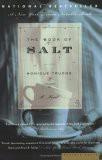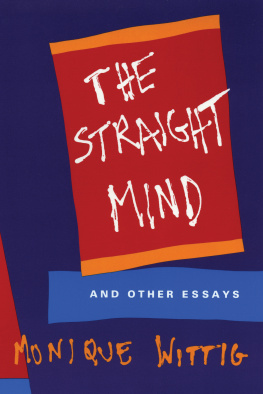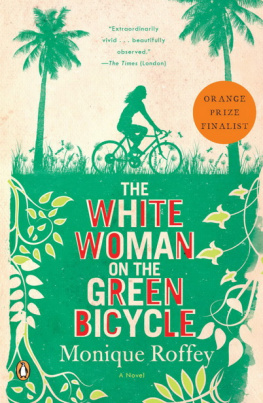Monique Truong - The Book of Salt
Here you can read online Monique Truong - The Book of Salt full text of the book (entire story) in english for free. Download pdf and epub, get meaning, cover and reviews about this ebook. year: 2004, publisher: Mariner Books, genre: Detective and thriller. Description of the work, (preface) as well as reviews are available. Best literature library LitArk.com created for fans of good reading and offers a wide selection of genres:
Romance novel
Science fiction
Adventure
Detective
Science
History
Home and family
Prose
Art
Politics
Computer
Non-fiction
Religion
Business
Children
Humor
Choose a favorite category and find really read worthwhile books. Enjoy immersion in the world of imagination, feel the emotions of the characters or learn something new for yourself, make an fascinating discovery.
- Book:The Book of Salt
- Author:
- Publisher:Mariner Books
- Genre:
- Year:2004
- Rating:5 / 5
- Favourites:Add to favourites
- Your mark:
- 100
- 1
- 2
- 3
- 4
- 5
The Book of Salt: summary, description and annotation
We offer to read an annotation, description, summary or preface (depends on what the author of the book "The Book of Salt" wrote himself). If you haven't found the necessary information about the book — write in the comments, we will try to find it.
The Book of Salt — read online for free the complete book (whole text) full work
Below is the text of the book, divided by pages. System saving the place of the last page read, allows you to conveniently read the book "The Book of Salt" online for free, without having to search again every time where you left off. Put a bookmark, and you can go to the page where you finished reading at any time.
Font size:
Interval:
Bookmark:
M ONIQUE T RUONG was born in Saigon in 1968 and moved to the United States at age six. She graduated from Yale University and the Columbia University School of Law, going on to specialize in intellectual property. Truong coedited the anthology Watermark: Vietnamese American Poetry and Prose. Her first novel, The Book of Salt, a national bestseller, has been awarded the 2003 Bard Fiction Prize and the Stonewall Book AwardBarbara Gittings Literature Award, among other honors. Granting Truong an Award of Excellence, the Vietnamese American Studies Center at San Francisco State University called her "a pioneer in the field, as an academic, an advocate, and an artist." She now lives in Brooklyn, New York.
OF THAT DAY I have two photographs and, of course, my memories.
We had arrived at the Gare du Nord with over three hours to spare. There were, after all, a tremendous number of traveling cases and trunks. It took us two taxi rides from the apartment to the train station before all the pieces could be accounted for. A small group of photographers, who had gathered for the occasion, volunteered to watch over the first load while we returned to the rue de Fleurus for more. My Mesdames accepted their offer without hesitation. They had an almost childlike trust in photographers. Photographers, my Mesdames believed, transformed an occasion into an event. Their presence signaled that importance and fame had arrived, holding each other's hands. Their flashing cameras, like the brilliant smiles of long-lost friends, had quickly warmed my Mesdames' collective heart. More like friends too new to trust, I had thought. I had been with my Mesdames for half a decade by then. The photographers had not been there from the very beginning. But once the preparation for the journey began, they swarmed to the entrance of 27 rue de Fleurus like honeybees. I could easily see why my Mesdames cultivated them. Every visit by a photographer would be inevitably followed by a letter enclosing a newspaper or magazine clipping with my Mesdames' names circled in a halo of red ink. The clippings, each carefully pressed with a heated iron, especially if a crease had thoughtlessly fallen on my Mesdames' faces, went immediately into an album with a green leather cover. "Green is the color of envy," my Mesdames told me. At this, knowing looks shot back and forth between them, conveying what can only be described as glee. My Mesdames communicated with each other in cryptic ways, but after all my years in their company I was privy to their keys. "Green" meant that they had waited desperately for this day, had tired of seeing it arriving on the doorsteps of friends and mere acquaintances; that the album had been there from the very beginning, impatient but biding its time; that they were now thrilled to fill it with family photographs of the most public kind. "Green" meant no longer their own but other people's envy.
I know that it may be difficult to believe, but it took the arrival of the photographers for me to understand that my Mesdames were not, well, really mine; that they belonged to a country larger than any that I had ever been to; that its people had a right to embrace and to reclaim them as one of their own. Of course, 27 rue de Fleurus had always been filled with visitors, but that was different. My Mesdames enjoyed receiving guests, but they also enjoyed seeing them go. Many had arrived hoping for a permanent place around my Mesdames' tea table, but I always knew that after the third pot they would have to leave. My Mesdames had to pay me to stay around. A delicious bit of irony, I had always thought. The photographers, though, marked the beginning of something new. This latest crop of admirers was extremely demanding and altogether inconsolable. They, I was stunned to see, were not satisfied with knocking at the door to 27 rue de Fleurus, politely seeking entrance to sip a cup of tea. No, the photographers wanted my Mesdames to go away with them, to leave the rue de Fleurus behind, to lock it up with a key. At the Gare du Nord that day, all I could think about were the flashes of the cameras, how they had never stopped frightening me. They were lights that feigned to illuminate but really intended to blind. Lightning before a driving storm, I had thought. But I suppose that was the sailor's apprehension in me talking. It had been eleven years since I had made a true ocean crossing. For my Mesdames, it had been over thirty. The ocean for them was only a memory, a calming blue expanse between here and there. For me it was alive and belligerent, a reminder of how distance cannot be measured by the vastness of the open seas, that that was just the beginning.
When my Mesdames first began preparing for the journey, they had wanted to bring Basket and Pp along with them. The SS Champlain gladly accommodated dogs and assorted pets, just as long as they were accompanied by a first-class owner. The problem, however, was America. No hotels or at least none on their itinerary would accept traveling companions of the four-legged kind. The discussion had been briefly tearful but above all brief. My Mesdames had in recent years become practical. Even the thought of their beloved poodle and Chihuahua languishing in Paris, whimpering, or, in the case of the Chihuahua, yapping, for many months if not years to come, even this could not postpone the journey home. There was certainly no love lost between me and those dogs, the poodle Basket especially. My Mesdames bought him in Paris at a dog show in the spring of 1929. Later that same year, I too joined the rue de Fleurus household. I have always suspected that it was the closeness of our arrivals that made this animal behave so badly toward me. Jealousy is instinctual, after all. Every morning, my Mesdames insisted on washing Basket in a solution of sulfur water. A cleaner dog could not have existed anywhere else. Visitors to the rue de Fleurus often stopped in midsentence to admire Basket's fur and its raw-veal shade of pink. At first, I thought it was the sulfur water that had altered the color of His Highness's curly white coat. But then I realized that he was simply losing his hair, that his sausage-casing skin had started to shine through, an embarrassing peep show no doubt produced by his morning baths. My Mesdames soon began "dressing" Basket in little capelike outfits whenever guests were around.
I could wash and dress myself, thank you. Though, like Basket, I too had a number of admirers. Well, maybe only one or two. Pp the Chihuahua, on the other hand, was small and loathsome. He was hardly a dog, just all eyes and a wet little nose. Pp should have had no admirers, but he, like Basket, was a fine example of how my Mesdames' affections were occasionally misplaced. Of course, my Mesdames asked me to accompany them. Imagine them extending an invitation to Basket and Pp and not me. Never. We, remember, had been together for over half a decade by then. I had traveled with them everywhere, though in truth that only meant from Paris to their summer house in Bilignin. My Mesdames were both in their fifties by the time I found them. They had lost their wanderlust by then. A journey for them had come to mean an uneventful shuttle from one site of comfort to another, an automobile ride through the muted colors of the French countryside.
Ocean travel changed everything. My Mesdames began preparing for it months in advance. They placed orders for new dresses, gloves, and shoes. Nothing was extravagant, but everything was luxurious: waistcoats embroidered with flowers and several kinds of birds, traveling outfits in handsome tweeds with brown velvet trims and buttons, shoes identical except for the heels and the size. The larger pair made only a slight effort at a lift. They were schoolgirlish in their elevation but mannish in their proportion. The smaller pair aspired to greater but hardly dizzying heights. Both my Mesdames, remember, were very concerned about comfort.
Next pageFont size:
Interval:
Bookmark:
Similar books «The Book of Salt»
Look at similar books to The Book of Salt. We have selected literature similar in name and meaning in the hope of providing readers with more options to find new, interesting, not yet read works.
Discussion, reviews of the book The Book of Salt and just readers' own opinions. Leave your comments, write what you think about the work, its meaning or the main characters. Specify what exactly you liked and what you didn't like, and why you think so.












